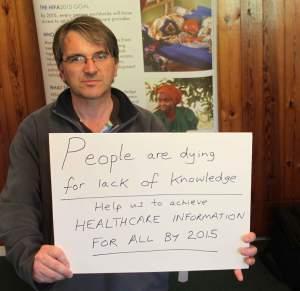Didier Demassosso from Cameroon has won the HIFA Country Representative of the Year 2014 . An interview with him by Isabelle
Isabelle – What is the role of a HIFA representative and what activities you have undertaken in relation to this?
Didier – A HIFA representative must allow a maximum of people to know, adhere to the idea of HIFA and make them participate in the online discussion forum of HIFA.He/she should promote the HIFA everywhere. I have talked about the HIFA to my university teachers, my colleagues in psychology, psychiatrists, decision-makers, psychology student, and physicians. I have promoted during the promotion of mental health in Cameroon in 2014 and early 2015. I have also promoted the HIFA in an advocacy manner in my blog (http: // www .ictandkulture.blogspot.com).

Didier Demassosso, Cameroon – HIFA Country Representative of Year Award 2014
Isabelle – What have been the contributions of HIFA for yourself, your organization, your country?
Didier – HIFA gave me a lot and still does till today. I have always been very sensitive to information as a tool for personal development. As a clinical psychologist at the end of his training and guidance counsellor, being a HIFA representative has been a way to use my skills pragmatically and evaluate them in a new area for me.
I can say that I do a bit of health communication and education for health ever since I am a HIFA representative. I have never as much set into perspective all my skills until now . It is not enough to be a representative of the HIFA; one most have a passion for health and management of information and knowledge referring to it. One must be able to mobilize a large amount of knowledge to solve information-related problems physicians, the layman,researcher, and policy makers ask. It is important to remember that I work in a context where the concept of “health literacy” is not included as a priority. Now I have a very clear vision of my professional carrier of my strengths and weaknesses at the professional level.
As a student in the Psychology Department of the University of Yaoundé I, I talked about the HIFA to my teachers and my classmates. A good amount of them are now member of HIFA. It is true that I have not extended my representative activities across the Cameroonian territory. This is an important goal this year. Nevertheless,
policymakers, important authorities of Cameroon are members of the HIFA. I’m sure
they now understand the importance of health care related information. For example, I had the support of Dr. Laure Menguene, Psychiatrist and Chief of Department of the Sub-Directorate for the Promotion of Mental Health and Psychiatry of The Ministry of Public Health. She allowed the HIFA I can say to be a friend of the Promotion of Mental Health in Cameroon. I could through her collaboration speak about the HIFA during coordination meetings of the Sub-Directorate for the Promotion of Mental Health and Psychiatry in the presence of clinical psychologists, former mental patients, psychiatrists, nurse specializing in Mental Health and theologian. I am seen to approach other makers, and researchers in the field of health to allow greater awareness and to be sensitive to information in health and health care.
Isabelle – What are the benefits, opportunities and challenges as HIFA representative of your country?
Didier – Being a HIFA representative, I could easily be listened by major research
organizations I approached, I can name EMERALD. I also felt I was listened by
foundations, and even Cameroonian authorities. Thanks to this position I could be
“empowered” to do important things for my country. However, as a HIFA representative for Cameroon, I am only a volunteer member yet with the responsibility to Promote the HIFA. I receive as benefits related to my membership,access to a significant amount of resources, links to scientific information in the field of health and related sectors. I also have the advantage and the opportunity to be in contact and collaborate with WHO authorities such as you Isabelle, I’m very honoured (smiles).
Despite the benefits and opportunities of the HIFA in terms of networking and developing my skills, I have many logistical difficulties. The internet is still not
readily accessible and affordable in Cameroon despite progress since some time. I
would have liked to use the internet to the maximum because many Cameroonians
are more and more online. But I cannot. Besides, participating in HIFA online discussions really helps in sharing and knowledge building and yet requires regular online presence that requires access to the Internet. I also find it very difficult to
improve the communication on the promotion of HIFA. I have attended and organized many conferences where the HIFA could have been visible if there were adequate communicational supports. In the school where I work I will like to have posters or any other material that may have a wider communication impact. Finally,the Cameroonian context even if it is fond of information is hardly interested in scientific information and its consumption. This is perhaps because there is no real communication and dissemination of research results. I am very interested in the dissemination of research products as part of changing attitudes. Valid information can truly make a difference. In brief, I believe that promoting HIFA can only be done by also promoting the concept of “health literacy”!
Join HIFA for free at http://www.hifa2015.org/
Conflicts of Interest : Dr. Soumyadeep Bhaumik had won the HIFA Country Representative of the Year Award previously

Dr Neil Pakenham-Walsh HIFA Coordinator with a plaque mentioning the importance of HIFA

